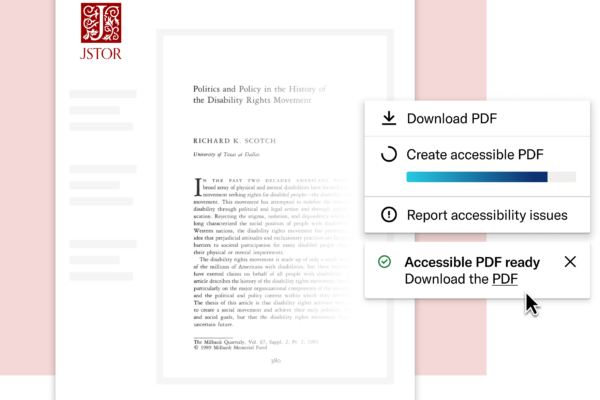
Inspiration can come at any time–and you want the ability to put pen to paper when it happens.
If you conduct research, let’s say for a thesis on Civil Rights Movements in the U.S. from the 50s through the 80s, you’ll need access a trove of history; first-person accounts of the Selma to Montgomery marches, Stonewall riots, or Zoot suit riots including historical events, documents, or letters. You’ll likely want to annotate and highlight them with your insights—but what if you weren’t limited to the computer sitting among the stacks of your library?
What if you could access all of your bookmarked passages, notes, annotations and highlights in one space, from anywhere?
That’s what a personal JSTOR account offers: a deeply personalized research experience, with Workspace.
What is a personal JSTOR account?
A personal JSTOR account is like having a portable digital filing cabinet. While institutional access grants you entry to JSTOR’s extensive library, a personal account transforms that access into a seamless, organized, and collaborative experience. The best part? It’s free and takes just minutes to set up.
The benefits of a personal JSTOR account
Save and organize with Workspace
Your JSTOR personal account comes with Workspace, a game-changer for research. Workspace allows you to:
- Save articles, images, and multimedia resources in one central place.
- Organize saved content into folders for easy access.
- Add personal notes to your materials to capture key insights.
- Easily export in PDF or Powerpoint format to streamline lecture slides and assignments—without having to start from scratch.
Imagine preparing for a major research project—no more scrambling to find that one article or image you vaguely remember. With Workspace, everything is just a click away.
Collaborate with ease
Whether you’re a student working on a group project or a professor collaborating with peers, a personal JSTOR account makes sharing resources simple. With a few clicks, you can share Workspace folders with colleagues or classmates, making information exchanges faster, and simpler.
Access resources anywhere
Institutional subscriptions can change, but your JSTOR personal account stays with you. By linking your institutional access, you ensure uninterrupted use of saved resources and materials, no matter where you are.
How to create and use your personal JSTOR account
Getting started is easy:
- Visit the JSTOR website and create a free account.
- Link your institutional access for seamless integration.
- Start saving, annotating, and organizing resources through Workspace.
Once your account is set up, explore features like resource sharing. For detailed guidance, check out this guide.
Who would benefit most from a JSTOR personal account?
- Students: Simplify research for essays, theses, or group projects with organized folders and saved searches.
- Educators: Build curated collections of articles and multimedia to use in your courses.
- Researchers: Stay ahead in your field by exploring the latest publications and creating a tailored research library.
Your personalized research hub awaits…
With a personal JSTOR account, you’re no longer just a visitor to JSTOR’s library—you’re the curator. You decide what to save, how to organize it, and when to revisit. The tools are here to help you save time, enhance your research, and collaborate effortlessly.
Ready to make JSTOR work for you?
Sign up for a personal account today and unlock the full potential of JSTOR’s resources. Start building your own digital research library and take your teaching, learning, and discovery to the next level.



